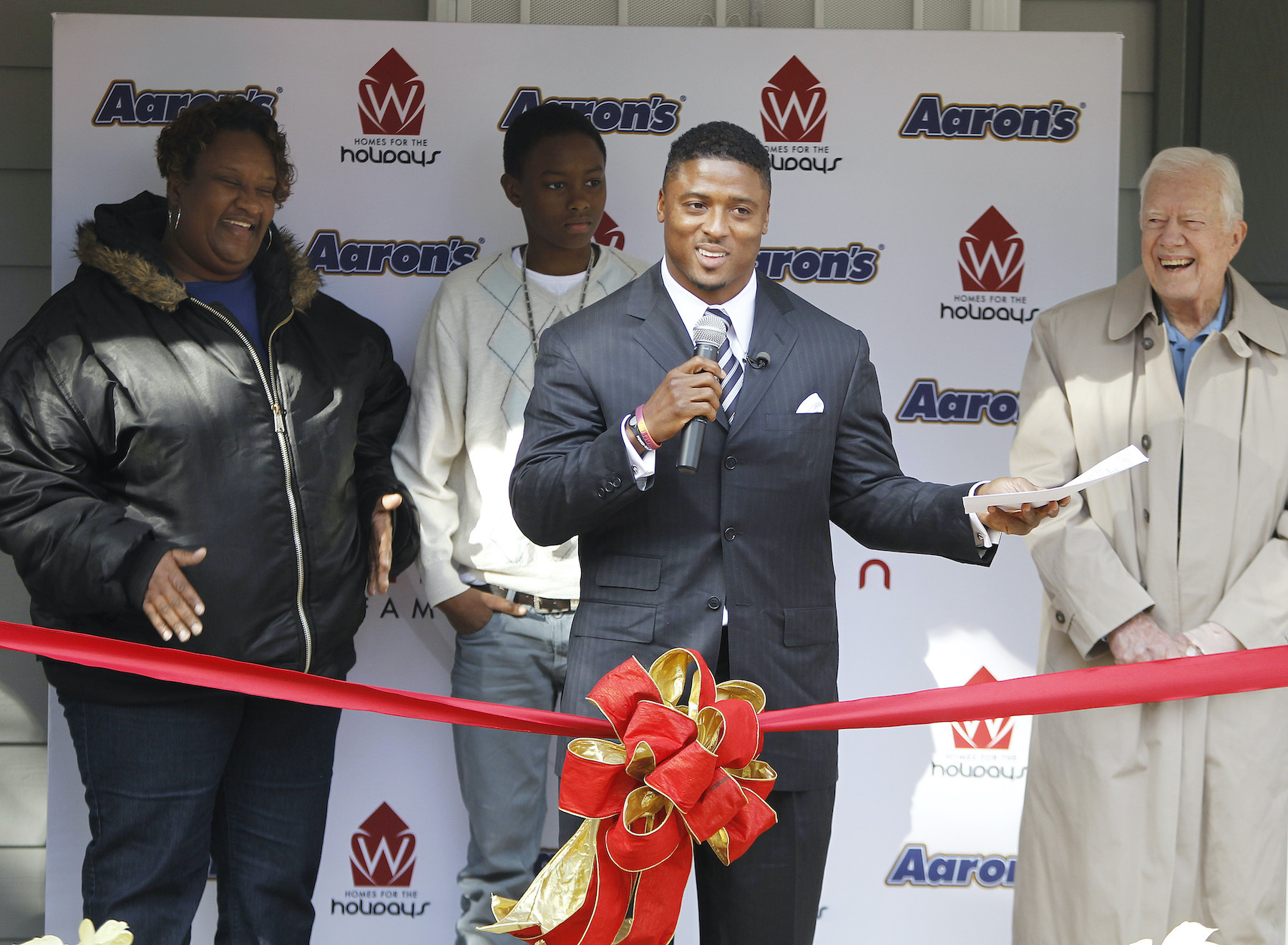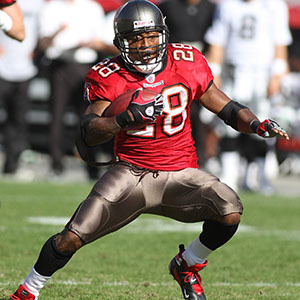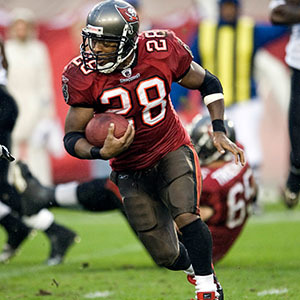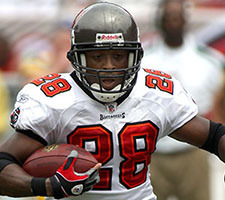Tragedy & Triumph: How Warrick Dunn Tackled Depression
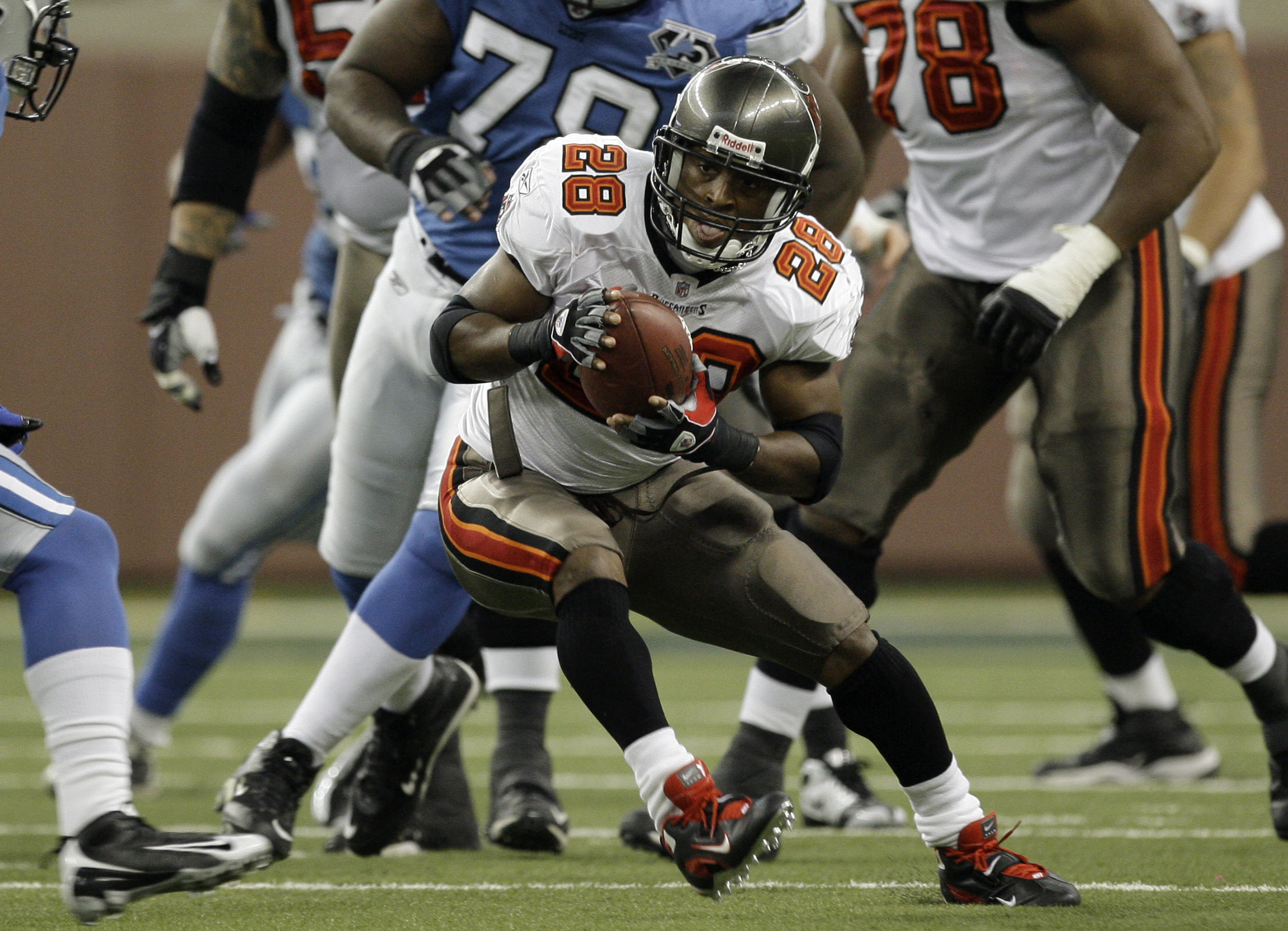
Warrick Dunn thought he was fine. Despite the pain of having his mother murdered two days after his 18th birthday and the subsequent burden of now having to raise his younger siblings, the running back believed he had effectively suppressed all of that with his successful football career. But in 2003, during his seventh season in the NFL, Dunn realized he needed help.
The former Pro Bowler, who spent 12 seasons with the Tampa Bay Buccaneers and Atlanta Falcons, recently opened up about his struggles with mental health and how he tackled his depression through professional counseling and support.
What motivated you to become a part of the mental health discussion, particularly among NFL players?
DUNN: You get to a point where you can’t continue to sit on the sidelines and not be a part of the conversation. And I think I was one of the first guys to actually come out and say I went to counseling. I wasn’t afraid to be condemned. I was so confident in myself because I knew I was doing what was best for Warrick and not public opinion. I think sometimes as athletes, we got lost on the simple fact that we’re supposed to be big and strong when the reality is, we’re human. So I thought it was important that I stated my situation, what I went through mentally, how it tied me down and stopped me from growing.
Now it’s only a matter of people really understanding the story and seeing that there are opportunities for everybody. No matter where you come from, there’s opportunities to grow as an individual and to better yourself, your situation and your surroundings.
How did you come to the decision that you needed professional counseling?
DUNN: Truth be told, sometimes you don’t know what you don’t know. Meaning, I didn’t know that I was depressed or that I was just floating through life. I didn’t know a lot of these things. But sometimes you wake up, and I was just in a situation where I was open-minded to hearing another story that ended up allowing me to help myself.
When I thought of someone using counseling to play the game of football, I thought that was crazy. It’s the game of football. But if a guy is doing that for football, why can’t I do that for my life? It’s one of those things where, once I got into it, I really started to understand that I was depressed, my heart was hardened and I wasn’t open. I was literally just a shell of what I could actually be in society and life.
Counseling really opened me up. I smiled more, I laughed. I think people can see I’m night and day between how I was in 1997 to now in 2017. It takes transformation and growth, but you have to be open to that.
Due to the stigma surrounding mental health among football players and the African-American male community, what gives you the strength to share your personal experience with depression?
DUNN: I got to a point where I can’t worry about other people. Sometimes we think we have to live our life for other people and that’s not reality. We have to live our lives for ourselves and other people benefit from that.
For myself, I put my life on hold because I had to take care of my brothers and sisters and make sure they went to college and so on. But I was short-changing myself. So I wanted to take some of my life back. I wanted to take some of the power back from the guy who shot and killed my mom. I got to the point where I thought counseling can put together the pieces that will bring my life back together. And it’s not a quick fix. Counseling takes a while and it took me six months to a year before I really started seeing any true progress. I just thought I was just talking and getting emotional and not really understanding. But people are designed to help you put the pieces back together. And I gradually started to do that.
What did the counseling sessions entail? Was it like what you see on TV, sitting on a couch?
DUNN: You could do that and you might get comfortable and fall asleep (laughs). But I sat in the chair and when I first went into the room, I never looked at the lady who was my counselor. I looked away because I wasn’t confident. It took some time to get comfortable, maybe 6 or 7 sessions over a course of 6 to 8 months before I would actually look at the counselor in her face and talk to her. I started to gain confidence because I was much more sure of myself and I also think it just took some growth.
How long did you attend counseling?
DUNN: I still go to this day. I don’t need intense counseling, but I still go just to continue to let somebody hear me. Things I have going on in my life, I’m able to express those in an environment that is conducive to me understanding and also getting it out.
I think sometimes people feel like you always have to go to counseling to talk about issues. But sometimes you can go just to talk about life. You have an outlet to release anything you have going on internally, good and bad, because there’s also some good things you can share, as far as the joys of life. I think it makes for a good balance and you’re not always pressured to be something you’re not.
What were the biggest takeaways from your time in counseling that you apply to your life now?
DUNN: I became much more self-aware. I wasn’t afraid to express myself. I’m still reserved, but I think it made me more conscious of my surroundings and the things that are before me so I don’t lose opportunities. It’s given me a different perspective because we all come from different backgrounds and we all have opportunities, so it’s also helped me encourage people that, if I’ve come from a dark place and I can turn it around, I know you can, too. My back was against the wall, so I think it’s given me a positive outlook that I just try to encourage other people, and it’s given me a really good story to where I’m able to impact other people’s lives in a positive way.
Warrick Dunn
How did you go about sharing this with your teammates?
DUNN: I think I’d earned their respect as a football player. In the beginning, I think I was afraid, but then I became much more sure of myself and I didn’t care about what anyone else had to say. You’re not living my life. In this society, we’re too focused on outside noise and we need to be more focused on what’s best for us because everybody’s situation is different.
How has the conversation about mental health, concussions and CTE evolved among players and locker rooms?
DUNN: For me, it’s more of, what are you going to do now? I can’t worry about what’s going to happen later. I’ve tried to put myself in a position, and I encourage anyone I’ve talked with to do the same, and that’s to get help immediately. Take advantage of the benefits. Who cares what anyone else says? You’ve got to do what’s best for you. I’ve tried to give more direction and encouragement because of trauma when it comes to the brain, concussions, longevity in the NFL, how do guys transition from playing a game they’ve played their entire lives and then now figuring out what they’re going to do, and figuring out what you’re passionate about. Football taught us that we’re always learning something new every day. You be a true pro and understand that you’re going to continue to learn. You have to be like that to figure out what you’re passionate about.
What resources are offered and should be offered by the league and union to help players in this space?
DUNN: It’s hard to say because I think the league has taken a better approach in making sure guys have access to a lot of benefits. I know that’s at the front of their mind to say, guys, these are the benefits that are available to you. It’s up to you to activate them. When I was coming out, a lot of this stuff was unknown. So the more we can know, the more we can educate ourselves to work on prevention so that we’re knowledgeable about the issues.
I think we definitely have to strive to be more solution-oriented and not just complain. I can’t tell you this is what we should definitively do because there are a lot of issues and I think everyone’s situation is different. You just have to navigate what is best for you and your family.
What advice would you give to a player who may be struggling with his mental health or the idea of going to counseling?
DUNN: I would tell them they don’t have to do it alone. They don’t have to feel like it’s all up to them to be strong. We all need help. We all need assistance. We all have people that rely on us and now it’s time for us to rely on them to support us in our journey.
Dunn is one of several NFL players devoted to eliminating the stigma surrounding mental health within professional sports. For more information about how the NFLPA is continuing the conversation among players and their loved ones, visit here.
For more information about the NFL’s Counseling Assistance Program available to active players through Cigna, please call (866) 421-8628.
